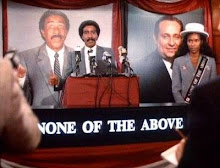
I’m not talking about the novel/radio play here (which is of course wonderful), I’m talking about THE book, which is…
‘Certainly the most successful, book ever to come out of the great publishing corporations of Ursa Minor. More popular than the Celestial Home Care Omnibus, better selling than Fifty Three Things to Do in Zero Gravity, and more controversial than Oolon Colluphid's trilogy of philosophical blockbusters - Where God Went Wrong, Some More of God's Greatest Mistakes, and Who is this God Person Anyway?’ Oh and plain old Wikipedia, off the internet.
A while ago it struck me that Wikipedia was, in reality the Guide. It was, to all intents and purposes everything that the guide set out to be. And then the other day when reading an excerpt from David Weinberger’s ‘Everything is Miscellaneous*’, for a book group we have at work it struck me that I had been utterly wrong. - This happens quite a lot, and I'm quite happy to fess up to the fact that I often hold ridiculous ideas I dreamt up in the
pub, but never really thought through.
(*nb. He's got a blog that its all based on)And I thought it would be a bit of a laugh to look at why my initial viewpoint was such a load of old dingoes kidney’s. Whilst in doing so, bringing out some of Weinberger’s arguments and my own thoughts on them.
HGTTG vs Wikipedia - the face off
Both books are the ultimate source of knowledge in the universe - now, it could be argued here that the Hitch Hiker’s Guide has competition... and that this competition mirrors the Wikipedia/Britannica conflict, for example:
The Encyclopaedia Galactica defines a robot as a mechanical apparatus designed to do the work of a man. The marketing division of the Sirius Cybernetics Corporation defines a robot as "Your Plastic Pal Who's Fun To Be With."
The Hitchhiker's Guide to the Galaxy defines the marketing division of the Sirius Cybernetics Corporation as "a bunch of mindless jerks who'll be the first against the wall when the revolution comes," with a footnote to the effect that the editors would welcome applications from anyone interested in taking over the post of robotics correspondent.
Curiously enough, an edition of the Encyclopaedia Galactica that had the good fortune to fall through a time warp from a thousand years in the future defined the marketing division of the Sirius Cybernetics Corporation as "a bunch of mindless jerks who were the first against the wall when the revolution came."
… But this is where the similarity ends.
The Guide is Commercial – Wikipedia is not. Weinberger argues that there is a an issue with Authority and Truth highlighting that most big media organisations rely on authority to sell – we need to trust that what the Times says is true or we wouldn’t pay for it, and as a result the Times has grown reliant on the money driven by its authority to cover costs and drive profit…
1-Nil to Wikipedia.
No problems with one of your agents getting stuck on a small blue-green planet somewhere in the western spiral arm of the galaxy for them.
The guide relies on field researchers like Ford Prefect (originally from the Betelguise vicinity), whereas Wikipedia is open source, user compiled.
Weinberger talks about the benefits of a user driven system. How it generates its own form of authority by being honest and open. How consumers are more active in drawing information from it – by having to sift through occasional inaccuracies and how they reach a NPV (Neutral Point of View).
My main issues with Weinberger’s point of view are that he treats knowledge as how we process information, and the basis for knowledge being about mutual agreement. Personally I think knowledge needs a more philosophical basis (be that scientific/empirical or whatever). And whilst I like the idea of NPV I’m not sure you could ever call them right. – None of which detracts from Weinberger’s POV.
2 – Nil to Wikipedia so far.
3 – Nil in fact if you count the NPV as superior to the validity of field reporters… remember how the Sirius Cybernetics Corporation cut Ford’s entry about Earth to two words… ‘Mostly Harmless’?
It’s crazy really that none of us saw it coming. Models like HGTTG seemed so plausible until social knowledge (Weinberger’s term) turned things on their head – and hilariously social knowledge is what societies had (to some extent) been doing for years prior to broadcast media.
So in the final run off, which is the winner….?
...Controversially it’s the Hitch-hiker’s Guide to the Galaxy.
Why?
Well for two reasons.
First. I’m not Wikipedia and I think its better.
Secondly and most importantly the Guide has the words ‘Don’t Panic’ embossed helpfully on its cover.
...Next week ebay vs some guy I met outside the grand bizarre in Istandbul trying to swap carpets for my girlfriend.










